|
|
|
Sort Order |
|
|
|
Items / Page
|
|
|
|
|
|
|
| Srl | Item |
| 1 |
ID:
116356
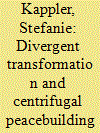

|
|
|
|
|
| Publication |
2012.
|
| Summary/Abstract |
This article problematizes the EU's approach to conflict transformation in its neighbouring countries, with specific reference to Bosnia and Herzegovina. It claims that the way in which the EU engages with domestic elites differs considerably from its engagement with the grassroots - an interaction that is heavily reliant on cooperation with civil society. This in turn produces a process of divergent transformation, creating further cleavages between elites and citizens. Emerging centrifugal processes obstruct the development of a common political platform for the citizens and represent an obstacle to the creation of a social contract in the peacebuilding context. This undermines the possibility of achieving sustainable peace and results in the transformation of past conflict into new conflict.
|
|
|
|
|
|
|
|
|
|
|
|
|
|
|
|
| 2 |
ID:
139231
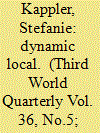

|
|
|
|
|
| Summary/Abstract |
This article challenges the notion of the ‘local’ as a static identity or set position and argues for a processual understanding of localisation, in which constant processes of delocalisation and (re-)localisation serve as tools by which peacebuilding actors position themselves in the political economy and the social landscape of peacebuilding. Peacebuilding agency and -identity are viewed as situated in time and space and subject to constant transformation. Using the cases of Bosnia-Herzegovina and Cyprus, I argue that the positionality of local identity is contingent on the ever-changing social context and political economy of peacebuilding. By viewing processes of (re-)localisation and delocalisation as markers of agency, we can overcome the binary between local and international and investigate more subtle forms of agency in a fluid peacebuilding environment. The article identifies the ways in which peacebuilding agency facilitates the creation of a particular set of identities (identification), before investigating the processes of delocalisation and (re-)localisation in detail. The article goes on to argue that, rather than being mutually exclusive, these two processes tend to happen in parallel and thus challenge the seemingly neat binary between local and international peacebuilding identities.
|
|
|
|
|
|
|
|
|
|
|
|
|
|
|
|
| 3 |
ID:
108252
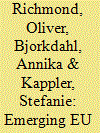

|
|
|
|
|
| Publication |
2011.
|
| Summary/Abstract |
The European Union (EU) is now emerging as a major actor in regional and global peacebuilding. Yet its peacebuilding approach and practices are subject to some significant and familiar contradictions. In this article, we identify the basis for what may become an 'EU peacebuilding framework' (EUPF), and argue that, while it aspires to a 'just and durable peace' including practical tools and a normative framework, these need to be set in critical relief. The EU's nascent approach to building peace is compared and contrasted with the evolving liberal peacebuilding consensus and the much criticized statebuilding project which has recently emerged. This is evaluated against recent research focusing on developing a more sophisticated form of contextually relevant peacebuilding. Finally, we assess how the embryonic EUPF might contribute to the development of a just and durable peace, and ask what sorts of issues and dimensions this raises.
|
|
|
|
|
|
|
|
|
|
|
|
|
|
|
|
| 4 |
ID:
141214
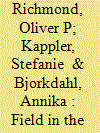

|
|
|
|
|
| Summary/Abstract |
This article highlights the semantic and socio-political meaning of the ‘field’ as it is used in both academic research and policy practices: as a geographic and material space related to forms of intervention in International Relations (IR), and not as a disciplinary space. We argue that the notion of the ‘field’ carries colonial baggage in terms of denoting ‘backwardness’ and conflictual practices, as well as legitimising the need for intervention by peacebuilding, statebuilding, and development actors located outside the field. We also show how academic practices have tended to create a semiotic frame in which the inhabitants of the research and intervention space are kept at a distance from the researcher, and discursively stripped of their agency. Along similar lines, policy-practice has reinforced the notion of the field as being in need of intervention, making it subject to external control. This article suggests that the agency of the inhabitants of the field has to be re-cognised and de-colonised so that political legitimacy can be recovered from ‘intervention’.
|
|
|
|
|
|
|
|
|
|
|
|
|
|
|
|
| 5 |
ID:
143342
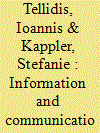

|
|
|
|
|
| Summary/Abstract |
Despite the volume of research exploring the use of information and communication technologies (ICTs) for destructive purposes (terrorism, crime, war propaganda) on the one hand, and development (ICT4D) on the other hand, very little has been said about the role that traditional, and especially new social media, can play for the transformation and prevention of conflicts. This paper recognises ICTs as a tool, thus accepting their multi-level and multi-dimensional potential in the transformation as well as the intransigence and promotion of conflict. The paper seeks to explore: (a) whether ICTs can empower marginalised actors to transcend the peacebuilding and statebuilding processes, and lead to a more locally-owned, more representative transformation of the conflict; (b) whether ICTs can foster more hybrid forms of peace; and (c) whether they can be co-opted as a platform by donors to promote their agendas and impede resistance.
|
|
|
|
|
|
|
|
|
|
|
|
|
|
|
|
| 6 |
ID:
106366
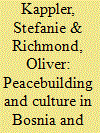

|
|
|
|
|
| Publication |
2011.
|
| Summary/Abstract |
This article investigates problems and pitfalls involved in the EU's peacebuilding activities in Bosnia and Herzegovina. It claims that by romanticizing civil society and selectively reinforcing existing power structures, the European Union has failed to give society a stake in the peace that is being created in that country. Against this background, the article goes on to argue that local responses and forms of resistance have begun to emerge in Bosnia and Herzegovina, challenging the EU's peacebuilding mission to move towards a more contextualized engagement with local society. Rather than focusing exclusively on the EU's formal institutional mechanisms, a more contextualized approach would seek to include a wide variety of local agencies and create a space in which Bosnian society might develop alternative versions of peace that relate to people's everyday lives. The main challenge for the EU, the article concludes, is to take the diversity of Bosnia's local voices seriously in efforts to promote a hybrid, sustainable peace.
|
|
|
|
|
|
|
|
|
|
|
|
|
|
|
|
|
|
|
|
|